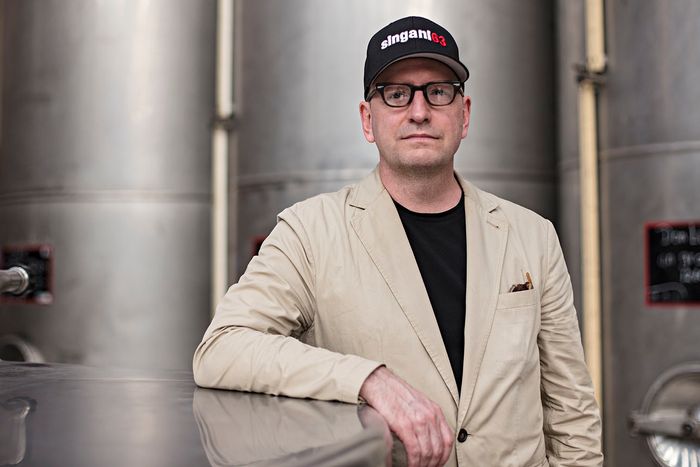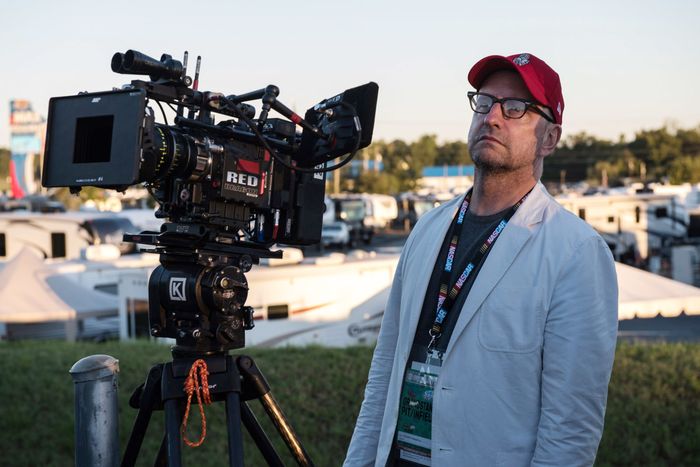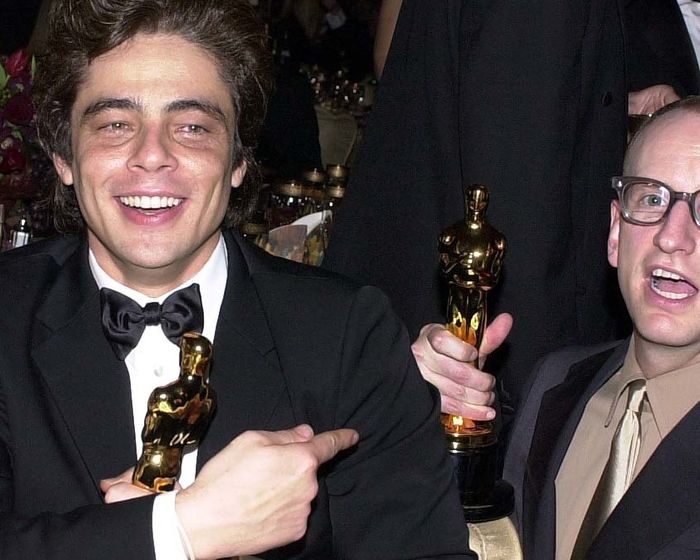Steven Soderbergh is a guy who just doesn’t know the meaning of retirement.
The acclaimed filmmaker, who has been behind such pictures as “Sex, Lies and Videotape” (1989), “Ocean’s Eleven” (2001) and the Oscar-winning “Traffic” (2000), announced plans about a decade ago to step away from making movies. But that proved short-lived: He has not only continued his work in film, with credits that include “Logan Lucky” (2017) and his latest project, “Magic Mike’s Last Dance” (2023), he has also moved into other media, such as with his 10-part Cinemax miniseries, “The Knick.”
Then, there’s Soderbergh’s side passion — namely, a Bolivian spirit called singani that he markets under the brand name Singani 63. Sodergergh led an effort to get singani recognized by U.S. governmental authorities as a distinct booze category — no different than, say, tequila or vodka. Earlier this year, approval was finally granted.
Soderbergh has also tackled other projects, including a one-time effort helping produce the Oscars in 2021. So, with the awards show coming up again this Sunday, MarketWatch spoke with the 60-year-old filmmaker about movies and booze as well as matters relating to personal finance. Here are edited excerpts from the conversation.
MarketWatch: For this Q&A series, we usually ask people if they ever think they’ll retire. But you’re in a unique situation: You did “retire,” but it really became more like a sabbatical. Tell us what happened.
Soderbergh: The next time I attempt to retire. I will a) not say so publicly and b) I’ll make sure that I post some rants that are so offensive that there’s no scenario in which I can unretire. But I think I sort of conflated my frustrations with the (movie) business with the job of directing. I was three months into this alleged retirement when I got (offered) the pilot episode for “The Knick” and I immediately realized I want to do this. So I reversed course. And when I was finally back on set, making that show, I realized my mistake, which is (that) I still like the job of directing. It’s just the business sometimes that makes me crazy. And I have to do a better job at ignoring the aspects of the business that I don’t like, and focusing on the thing I do like.

Steven Soderbergh is behind the booze brand Singani 63 and also led an effort to have singani recognized as a distinct spirits category by the U.S. government.
Singani 63
MarketWatch: Let’s talk about singani. After a multi-year effort, you got the spirit officially recognized by the U.S. government as a category all its own. Why was that important to you?
Soderbergh: When you want to import a spirit — in this case, a spirit that’s never been outside of Bolivia — you apply with the U.S. government. And so I was approved to be the importer and the designation came back that (singani) would be labeled as a brandy. But I had an idea in my head of what brandy was, which did not align with what I considered singani to be. We think of brandy (as) a brown liquid that you drink out of a snifter in a library and there are cigars and old white guys. And this was something that was concerning to me because I felt that a consumer would be confused by this designation.
I started asking questions about the options available to us and so many (people) told me the story of Steve Luttman, (the founder of) Leblon cachaça, and their petition and battle to get a category type for cachaça. So, I reached out to Steve, and he was very generous in sharing his roadmap of their 10-year plan to get recognition for cachaça and we basically followed that plan. In our case, it took eight years.

Steven Soderbergh on the set of “Logan Lucky.”
Everett Collection
MarketWatch: Now, let’s talk a little bit about the Oscars — something you know about both from winning an Oscar for “Traffic” and from co-producing the awards show in 2021. Why is it that we always have these controversies associated with the Oscars, such as the “La La Land”/”Moonlight” mixup in 2017 or the Will Smith slap last year?
Soderbergh: (It’s) probably the pressure. It’s a very strange form of psychological torture for the people that are involved, the nominees. The best thing about being a producer on the Oscars for me was the day after — waking up and knowing that I did not have to produce the Oscars. And my heart goes out to anybody that takes that job on. It’s insane. I mean, it’s really insane. We had a great group of people and a really good experience (in 2021), but by any objective metric, it’s ridiculously complicated, and not only logistically, but in a personal sense because of all the people that you’re dealing with.
MarketWatch: Any predictions for who’s going to win this year in the major categories, especially best picture?
Soderbergh: If you follow the algorithms, it looks like “Everything Everywhere (All At Once)” is the front-runner right now. But I’m always wary of making any hard and fast predictions based on the award-season track record because there’s usually one or two surprises every year, there’s a dark horse that nobody saw coming. So I’ll be watching like everybody else, yelling at the television.
MarketWatch: Streaming has really changed things in Hollywood, to say nothing of the attendance decline since the pandemic. Will the movies ever recover? And if so, how?
Soderbergh: It seems unlikely that attendance will return to its pre-pandemic peak. But I think the larger philosophical question has to do with the fact that, in cultural terms, movies don’t matter the way they did when I was growing up. Movies had a portion of the cultural real estate that they don’t have anymore. I think it’s still a viable business, although there’s going to need to be increasing fluidity on the part of the exhibitors (meaning movie theaters) about how this is all going to work. I think part of the problem that we’re confronting is that everybody is looking for, in terms of theatrical release (versus streaming), a template that they can just overlay onto everything. And that’s never going to work. Every movie has a different shelf life, a different audience that it’s targeting.
And so, for instance, if you have a movie that you’ve put out in wide release (in theaters) and spent a lot of money marketing…let’s say you actually know it’s going to be a disaster. You should be able to get your movie out everywhere (onto streaming platforms) as quickly as possible. You shouldn’t be restrained. And the theaters need to be more fluid in a situation like that, where somebody’s really taking a beating.

Steven Soderbergh (right) with actor Benicio Del Toro in 2001 after they both won Oscars for their work on the film “Traffic.”
AFP via Getty Images
MarketWatch: Let’s move on to some fun financial questions, beginning with this: What’s the best piece of financial advice you’ve been given?
Soderbergh: Simon Ford of Ford’s Gin (a boutique spirits brand) once said to me, “Don’t confuse expansion with growth.” And that’s one of the most succinct and true things anybody’s ever said to me. And I’ve tried to keep that in mind as we try to expand (Singani), to make a distinction between those two things. It’s sort of what happened with the movie-theater construction boom of the ‘80s and ‘90s (when) all these multiplexes started springing up. From a certain perspective, somebody could say, “Wow, movie exhibition is really growing.” Well, as it turns out, it was expanding more than it was growing. Meaning it wasn’t like attendance suddenly shot through the roof. It went up a little bit, but not in proportion to the number of screens that were now available. So that’s what you’ve got to avoid.
MarketWatch: What’s something you hate spending money on?
Soderbergh: Anything that’s inefficient. That can mean you’re confronting a system or a way of doing things that is so entrenched that it can’t be rebuilt and therefore you’re kind of stuck subsidizing a methodology that you find incredibly wasteful and yet (you) don’t have the time or the resources to rebuild it from scratch. (It’s) a variation on something you hear in every business, which is, “Well, this is how it’s always been done.”
MarketWatch: Conversely, what’s something you don’t mind splurging on?
Soderbergh: Talent. Getting and keeping good people is rule number one for me.
MarketWatch: Any big money mistake you’ve made?
Soderbergh: I didn’t grow up in an environment where money was valued in and of itself. It was always presented to me as a tool to make things happen. So most of the disposable income that I spend is financing things either for myself or for other filmmakers. Some of those have worked out, some of them haven’t. I view that as part of the fun of it all.
If (the projects) lost money, that’s the way it goes — they’re movies. And at least the movie still exists and people can see it. There’s a physical thing that was made. It wasn’t, you know, a derivative swap. There’s an actual thing that people can look at.
MarketWatch: What’s a favorite possession of yours? Is it your Oscar?
Soderbergh: No, he’s sitting in his Crown Royal (whiskey) bag in a closet. (It’s) my books. If you forced me to choose between the ability to watch things and the ability to read, I would take reading.
MarketWatch: Do you think you’ll ever retire for real?
Soderbergh: I think it would be hard for me to do nothing, but I think it’s conceivable that I might at some point segue out of activities that force me to leave the house and move into a space that might involve writing. There are a couple of book projects I’ve been working on for a long time that I really would like to complete.
MarketWatch: Will you miss making pictures?
Soderbergh: Directing is the best job in the world. To walk into a room and say, “Oh I have this idea and I need you to give me the money to go do it” and to have somebody say “Yes”…I mean, there’s no video game that can approach the complexity of being on a film set and dealing with that many personalities and money and time and weather. It’s just a great job.





